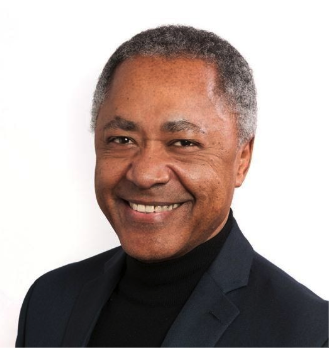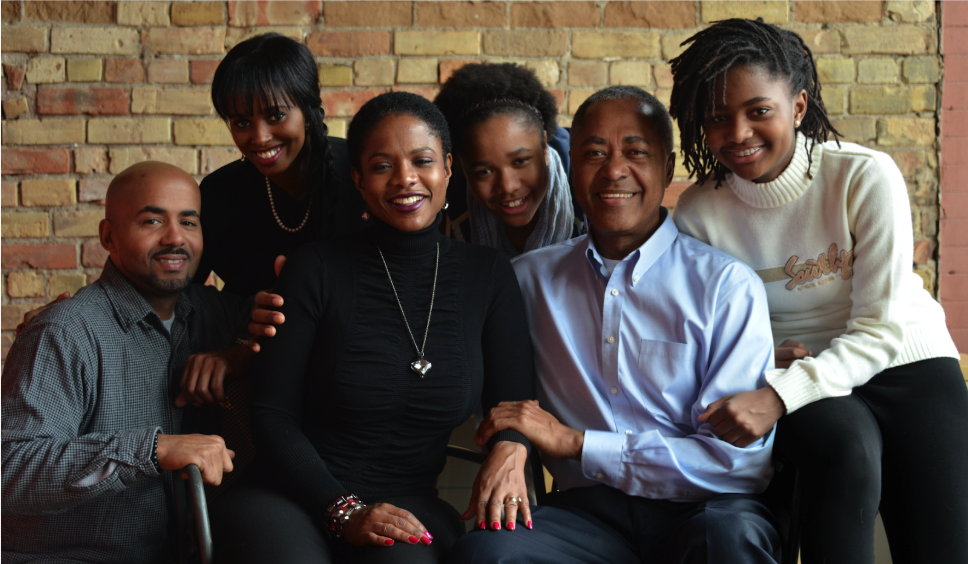

 Well, that is not a difficult question for me. I'm still very grateful for this gift that was given to me by someone I have never met. I had just recently emigrated from Jamaica to the United States. I was 21 years old. I had been given information about a design school here in New York. I had registered and got accepted and arrived, and discovered very quickly what a credit was. I didn't know what a credit was. So I discovered that this school was not accredited, and so I asked around for what was the best school for design in the United States. I wanted to go to the very best school, and I felt that if I put myself out there that God would provide a way. So I registered for Pratt Institute in New York, and got accepted, and didn't have any way to pay that private college bill.
Well, that is not a difficult question for me. I'm still very grateful for this gift that was given to me by someone I have never met. I had just recently emigrated from Jamaica to the United States. I was 21 years old. I had been given information about a design school here in New York. I had registered and got accepted and arrived, and discovered very quickly what a credit was. I didn't know what a credit was. So I discovered that this school was not accredited, and so I asked around for what was the best school for design in the United States. I wanted to go to the very best school, and I felt that if I put myself out there that God would provide a way. So I registered for Pratt Institute in New York, and got accepted, and didn't have any way to pay that private college bill.
So I had a minimum-wage job operating an elevator in Manhattan, one of those old-style elevators with the handle and the attendant. I barely was making it, even just for living expenses. There was a gentleman who was always going up and down in the elevator. In fact, he helped me to get that job through friends, and I was actually working illegally. So that's a very vulnerable employee. I don't know if they knew I was working illegally, but I knew, and I felt very vulnerable. I did not qualify for... could not get good jobs, because anything above the minimum wage they were rigorous about did you have qualifications to work. But anything below minimum wage jobs, the questions didn't come so rigorously. So that's how people who are not allowed to work got jobs.
So I was operating this elevator and Ray came in. He worked on the third floor, and every time he came into the elevator he would ask me how my life was going. He knew that I'd applied for Pratt Institute, he knew that I'd gotten accepted, he knew that I had no money and that I was just hoping that God would provide for me. And so the story went every time, “Did you get in? Did you hear anything about resources?” “No.” Finally, the day of the first day of school came and went, and Ray's question came and went. My answer came and went. That happened every day for a week and a half. At the end of the second week, Ray told me that he had told my story at his church, and that a gentleman there was making me an offer.
He was going to propose that I produce the bill for the semester. He would give me a check for the full amount of the tuition, and then at the end of the semester if I produced my grades and the bill for the next semester, he would produce another check for that semester. And then, if by the beginning of the next year I paid off everything I owed, he would re-up and give me a check for that first semester of the next year. So that's how I made it through college. I worked two jobs during the semester sometimes, three jobs during the summer. I went to one movie during my entire school career, and went to a restaurant I think one time. I just ground it out for four years, and that's how I went through college.
I do not remember the guy's name. I think it was Carpenter. I had a lot of confidence that it was Carpenter. I never met him. I just got the check with his name on it, and sent him thank you notes. He never tried to connect with me beyond that, and I couldn't connect with him beyond that. And so about 10 years ago, I reconnected with Ray from the elevator and asked him if he could connect me with the family of the man who had given me such great help. He couldn't remember the guy's name, he didn't remember the name. He would try, he said. Well, Ray was by that time fading; he was in a nursing home, and he never remembered the name. And he didn't think it was Carpenter.
And so to this day, I wish I could get in touch with his family to tell them that even though he might have passed on by now, that their father or uncle did an invaluable charitable gift for someone and that they were able to make a contribution to industry for 30 years and then politics for 15 years, and then nonprofit work for another six years so far. So, that's the nicest thing that anyone has ever done for me.
|
Click here to read Don Samuels' previous article in Catalyst: Click here to watch and read Don Samuels' video interview in Catalyst: |
 Don Samuels spent 27 years in the toy industry as an R&D executive and an independent inventor/designer. An ordained minister, Don evolved from community leader to become a 3-term Minneapolis council member and a Minneapolis School Board member. He also served as chair of the Public Safety Committee. He also was elected to the Minneapolis School Board for 4 years.
Don Samuels spent 27 years in the toy industry as an R&D executive and an independent inventor/designer. An ordained minister, Don evolved from community leader to become a 3-term Minneapolis council member and a Minneapolis School Board member. He also served as chair of the Public Safety Committee. He also was elected to the Minneapolis School Board for 4 years.
Don is CEO of MicroGrants, which spurs economic self-sufficiency by giving business and career grants to low-income people of potential through the partner agencies that train them. MicroGrants also administers the nationally recognized Lights On program.
Don co-founded the PEACE Foundation in 2003 to address community violence. Upon discovering the connection to academic failure and violence, PEACE was morphed into the Northside Achievement Zone, transforming educational outcomes for 1,000 families and 2,300 children.
Don now serves on the board of St. Paul, Minnesota-based Luther Seminary, Twin Cities Rise, and The Center for Action and Contemplation, and is on the advisory board of The Trust for Public Lands. He is a recent graduate of The Living School.

Don and his wife, Sondra Hollinger Samuels, live in the Jordan Neighborhood of North Minneapolis. They have two daughters in college. Their independent daughter and son live in New York City.
Catalyst is produced by The Shift Network to feature inspiring stories and provide information to help shift consciousness and take practical action. To receive Catalyst twice a month, sign up here.
This article appears in: 2020 Catalyst, Issue 4: Black History Month